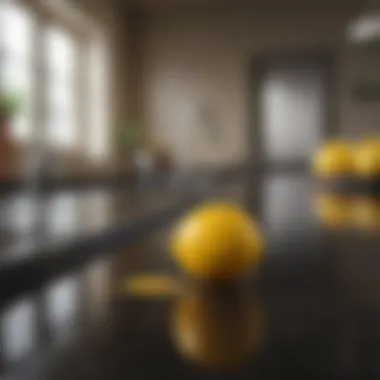The Power of Lemon as a Natural Disinfectant


Intro
Lemon is more than just a citrus fruit. Its potent natural disinfectant properties make it a valuable tool in household cleaning and food safety. The chemical composition of lemon, particularly its high citric acid content and antimicrobial properties, allows it to combat a range of pathogens effectively. This article will explore these aspects in detail, providing a comprehensive overview of how lemon can be utilized in various settings. While conventional disinfectants often contain harsh chemicals, lemon offers a gentler alternative that is both effective and environmentally friendly.
Understanding the efficacy of lemon not only enhances cleanliness but also incorporates a sustainable approach to everyday living. Homeowners and design enthusiasts can benefit from integrating lemon-based solutions in their spaces. Whether you are cleaning kitchen surfaces, sanitizing cutting boards, or adding a fresh scent to your home, lemon serves as a flexible option. This guide will provide practical strategies for reaping the benefits of lemon as a disinfectant, revealing its potential in regular household chores and beyond.
Design Inspiration
Creating inviting and healthy spaces can be accomplished through thoughtful design. The use of natural disinfectants like lemon can contribute to the aesthetic and cleanliness of interior decor.
Trending Styles and Themes
The current home design movements often favor natural materials and products. Incorporating lemon not only aligns with these styles but also enhances the environment with a clean, fresh scent. Many homeowners are opting for minimalist and sustainable approaches, focusing on long-lasting materials that promote a healthier habitat.
Color Palettes and Combinations
When thinking about design inspired by lemon, the bright yellow hue can serve as a vibrant accent. Pairing lemon yellows with soft greens and whites creates a refreshing atmosphere. Additionally, incorporating natural wood elements complements the citrus theme, creating warmth and balance in various rooms.
Practical Applications
The versatility of lemon as a disinfectant allows it to be used in various applications. Here are some common uses of lemon in maintaining a clean environment:
- Kitchen Sanitization: Lemons can be used to sanitize cutting boards and surfaces. Their acidity helps break down bacteria.
- Freshening Up Fabrics: Mixing lemon juice with water can be used for fabric sprays to reduce odors.
- Air Freshening: Lemon peels placed in a bowl can absorb bad odors and provide a fresh scent.
Incorporating lemon into daily routines not only aids in cleanliness but also supports a healthier living environment.
Finale
As discussed, lemon stands out as an effective and natural disinfectant. Its multiple applications not only serve functional purposes but also promote a cleaner and fresher living space. By considering the integration of lemon into your home, you capitalize on its benefits. This article aims to equip homeowners, gardening enthusiasts, and design lovers alike with insights into harnessing lemon's efficacy for enhanced environments.
Intro to Lemon as a Disinfectant
The use of lemon as a natural disinfectant is an increasingly relevant topic in today's world. As individuals seek more eco-friendly and health-conscious cleaning alternatives, lemon stands out due to its natural properties. This section will explore the significance of lemons in the context of disinfection, highlighting the benefits and considerations associated with employing this everyday fruit.
Lemon is not just a culinary delight; it possesses potent antimicrobial properties that make it ideal for disinfection. The acidic nature of lemon juice can effectively neutralize harmful germs, while its fresh scent also provides an appealing alternative to harsh chemical smells found in conventional disinfectants. This dual functionality appeals to many who desire a clean and pleasant living space without the adverse effects of synthetic cleaners.
Understanding the role of lemon in disinfection means recognizing the broader trend toward natural solutions in household maintenance. Natural disinfectants, including lemon, often provide a safer option for families, especially those with children and pets. Moreover, the simplicity of using lemon in various applications—cleaning kitchens, sanitizing surfaces, and even food preparation—makes it an accessible choice for homeowners.
Defining Disinfectants
Disinfectants are substances or preparations used to destroy or inhibit the growth of pathogenic microorganisms. They play a crucial role in maintaining hygiene and preventing the spread of infections in various settings, including homes, hospitals, and food preparation areas. Effective disinfectants must demonstrate efficacy against a range of germs, including bacteria, viruses, and fungi.
Lemon, as a natural disinfectant, operates primarily through its active compounds. The most notable of these is citric acid, which has been shown to exhibit antiviral and antibacterial properties. It is important to note that while lemon can be effective against some pathogens, it may not replace stronger chemical disinfectants, particularly in environments requiring stringent sanitization.
Historical Perspective on Natural Disinfectants


Historically, the use of natural disinfectants predates modern science. Ancient civilizations often turned to plants and natural substances to combat infections and promote cleanliness. Records show that lemon and other citrus fruits were utilized in traditional medicine and cleaning practices long before the rise of synthetic disinfectants.
With increasing awareness of environmental concerns and health implications associated with chemical cleaners, there has been a resurgence in interest in these historical practices. In modern times, lemon has been rediscovered not just for its benefits in cooking and flavoring, but also for its practical applications in cleaning and disinfection. The shift toward natural disinfectants like lemon reflects a growing desire for sustainability and health-oriented choices in our daily lives.
Chemical Composition of Lemon
Understanding the chemical composition of lemon is crucial to appreciating its role as a disinfectant. Lemons possess various bioactive compounds that confer sanitizing properties. Among these compounds, citric acid stands out due to its ability to inhibit microbial growth. Furthermore, lemon also contains other phytochemicals that work synergistically to enhance its disinfectant capabilities. This section will explore these elements and their contributions to lemon's effectiveness as a natural disinfectant, making it a valuable asset for homeowners, interior design enthusiasts, and food safety advocates.
Citric Acid and Its Antimicrobial Properties
Citric acid is primarily responsible for the antibacterial effects observed in lemon juice. It acts by disrupting the metabolic processes of bacteria and fungi. This disruption leads to a decrease in their ability to proliferate, effectively reducing microbial load. Research indicates that citrus fruits, particularly lemons, can inhibit pathogens such as E. coli and Salmonella. The acidic nature of citric acid lowers the pH level on surfaces, creating an environment less favorable for microbial survival.
Despite its effectiveness, it's important to understand that citric acid is not a broad-spectrum disinfectant. While it performs well against certain bacteria, its effect may be limited against viruses and more resistant pathogens. Thus, while lemon can serve as a natural disinfectant, it should not entirely replace conventional disinfectants in critical situations.
Other Phytochemicals Contributing to Disinfection
Lemon's disinfectant properties are not solely attributed to citric acid. Other phytochemicals in lemons contribute to its antimicrobial efficacy.
- Limonene: This is a major component of lemon oil, known for its potential to kill bacteria and viruses. It has shown promise in cleaning applications and can provide an aromatic benefit as well.
- Flavonoids: These compounds have antioxidant properties that may enhance the overall antimicrobial activity of lemon. They can contribute to the stability of lemon juice, extending its effectiveness over time.
- Ascorbic Acid: Also known as Vitamin C, this compound can strengthen the immune response and has some antibacterial properties.
Together, these compounds create a multi-faceted approach to disinfection when using lemons, making them a robust option in both home cleaning and food safety practices.
The unique chemical composition of lemon facilitates its use as a powerful natural disinfectant, merging efficacy with safety conditions.
In sum, the chemical composition of lemon is significant in understanding its efficacy as a disinfectant. The dual action of citric acid combined with other beneficial phytochemicals makes it a versatile component in cleaning and sanitation procedures.
Comparative Analysis with Conventional Disinfectants
Understanding the comparative aspects of lemon as a disinfectant versus conventional disinfectants is crucial for several reasons. Firstly, homeowners and individuals interested in interior design or food safety benefit from knowing how lemon stacks up against widely used products. This comparison highlights not only the efficacy of lemon but also its safety profile and environmental impact.
Efficacy Against Specific Pathogens
Lemon juice, due to its high citric acid content, demonstrates significant antibacterial and antiviral properties. Studies show it can be effective against common pathogens such as Escherichia coli and Staphylococcus aureus. This is notable since many traditional disinfectants depend on strong chemical agents to achieve similar results.
- Targeted Pathogen Control: While lemon can reduce specific bacteria and viruses, conventional disinfectants often have broader spectrum activity. For example, products like Clorox Disinfecting Wipes are specifically designed to address a range of pathogens, including harder-to-control viruses.
- Surface Residues: Unlike some conventional disinfectants that can leave behind residues potentially harmful to health, lemon evaporates leaving little to no trace after use. This aspect can be especially appealing for food preparation areas where contamination might occur.
Research supports the idea that lemon works best on certain surfaces where bacteria thrive. For instance:
- Glass and Metal: Lemon solutions are often effective on these surfaces where conventional disinfectants might leave streaks or require rinsing.
- Wood: The natural properties of lemon help break down grime and bacteria without potential damage to the wood, a risk with harsh chemical cleaners.
Safety and Environmental Impacts
One of the key advantages of using lemon as a disinfectant is its safety, particularly in comparison with conventional disinfectants. Conventional products often contain a variety of synthetic chemicals that can pose risks to both health and the environment.
- Health Risks: Regular use of products like Lysol or Bleach can lead to respiratory issues, skin irritations, and other health concerns. On the other hand, lemon is a natural option with a much lower risk profile.
- Environmental Concerns: Many people are now conscious of the environmental repercussions of their cleaning choices. Conventional disinfectants can contribute to water pollution and contain substances harmful to wildlife. In contrast, lemon offers a biodegradable solution that can easily integrate into eco-friendly living practices.
In summary, while lemon may not completely replace conventional disinfectants for every situation, it indeed offers a compelling alternative that aligns with a more natural lifestyle.


"Natural solutions like lemon can often serve multiple purposes beyond cleaning, making them valuable additions to your household routines."
Additionally, awareness of these options encourages sustainable practices within households, ultimately leading to a healthier living environment. This comparative analysis provides insight into when and how to best utilize lemon in everyday applications.
Practical Applications of Lemon as a Disinfectant
Lemon's role as a disinfectant extends beyond its chemical composition; it plays a vital part in practical, everyday applications. Utilizing lemon for disinfecting purposes offers a multitude of benefits while simultaneously promoting sustainability. It is important to explore where lemon can be a powerful ally in sanitation processes, such as within households and food safety.
Household Cleaning
Household cleaning is one of the most prominent practical applications for lemon. The versatility of lemon juice makes it an effective cleaner in various settings. The natural acidity helps break down grime and grease, making it particularly beneficial in high-traffic areas.
Kitchens and Food Preparation Areas
Kitchens are focal points for cleanliness given their role in food preparation. The use of lemon in these areas addresses both sanitation and odor removal. A key characteristic of kitchens is the presence of food residues, which can attract various pathogens. Lemon's natural antibacterial properties aid in eliminating these pathogens, making it a reliable choice.
Moreover, its pleasant scent adds to the ambiance of a clean kitchen.
Unique to kitchens is the potential for cross-contamination. A disadvantage can arise if lemon juice is not diluted properly; it may not provide a strong enough solution against certain bacteria. Proper usage, like cleaning countertops with diluted lemon juice, enhances its disinfecting ability.
Bathrooms
The bathroom is another space where cleanliness is paramount. The frequent moisture in bathrooms can lead to mold and mildew, making effective disinfectants necessary. Lemon proves advantageous here, as it possesses antifungal properties, which help mitigate these issues.
Bathrooms demand an effective yet safe cleaning approach. Lemon serves as a natural alternative to harsher chemicals, promoting a healthier indoor environment. However, the high acidity of lemon can be detrimental to certain surfaces, such as natural stone. This requires careful consideration of where it is applied.
Living Spaces
Living spaces, including living rooms and bedrooms, often require cleaning that balances efficacy with gentleness. The use of lemon in these areas helps maintain a fresh atmosphere. A key characteristic of living spaces is the accumulation of dust and allergens, which lemon can help neutralize.
One unique feature of lemon-based solutions is their ability to deter pests naturally. However, effectiveness may vary based on the environment. Thus, while lemon can enhance cleanliness, it should complement other cleaning methods for optimal results.
Food Safety and Preservation
Food safety and preservation is another important aspect of lemon's application. It engages with both hygiene and extending the shelf life of food, which is crucial in any household.
Using Lemon in Food Storage
Using lemon in food storage is a significant way to harness its disinfecting properties. The citric acid found in lemons not only prevents bacterial growth but also helps to preserve freshness. This characteristic is particularly beneficial in prolonging the shelf life of perishable items.
The unique feature of lemon in this context is its natural ability to inhibit oxidation. However, it is vital to note that while lemon can aid in preservation, it does not replace proper refrigeration or storage methods. Its application can complement other practices to enhance food safety.
Cleaning Fresh Produce
Cleaning fresh produce is essential to ensure safety before consumption. The acidic nature of lemon juice effectively removes pesticide residues and may reduce the presence of bacteria on fruits and vegetables. This makes it a popular choice among health-conscious individuals.
One of the standout benefits of using lemon for cleaning produce is its efficiency combined with safety. Unlike many commercial produce cleaners, lemon is edible and free from synthetic chemicals. However, a disadvantage can be that not all bacteria may be eliminated, so thorough rinsing with water afterward is advisable to ensure maximum safety.
By integrating lemon into practical applications such as household cleaning and food safety, individuals enhance their sanitation methods while fostering a more eco-friendly environment. The varied strategies for utilizing lemon demonstrate its multifaceted nature, making it a valuable tool in everyday life.


Incorporating Lemon in Interior Design Practices
Incorporating lemon into interior design practices has gained attention due to its unique qualities that enhance atmosphere and cleanliness. The natural disinfectant properties of lemon extend beyond mere cleaning; they can also create appealing aesthetics and uplift the sensory experience within a space. Using lemon infused elements in design can signify a commitment to sustainability and health, both desirable attributes in contemporary design.
Aesthetic and Aromatic Benefits
Lemon offers a vibrant color palette that can brighten any interior. The bright yellow hue can invigorate spaces, making them feel more open and lively. Arranging fresh lemons in a bowl or using lemon-themed decor can introduce a touch of freshness to kitchens or dining areas.
The aroma of lemon is another powerful aspect. Research shows that citrus scents can enhance mood and promote mental clarity. Introducing lemon essential oils into the design may transform an ordinary room into a sanctuary. Lemon-scented candles or diffusers add both fragrance and a calming effect. Homeowners and interior designers can benefit greatly from these simple yet impactful changes.
Creating Natural Cleaning Solutions
Using lemon to create natural cleaning solutions aligns with eco-friendly living practices. Homeowners can easily combine lemon juice with vinegar or baking soda to form effective cleaning agents without harmful chemicals. Such solutions are ideal for sanitizing surfaces in kitchens or bathrooms while also contributing to a healthier indoor environment.
- Lemon Juice and Vinegar: Mixture of these can cut through grease and disinfect surfaces.
- Baking Soda and Lemon: This combination acts as a gentle abrasive, perfect for scrubbing tough stains.
- Lemon Oil and Water: A spray of diluted lemon oil can freshen up any area.
Sustainability and Eco-Friendly Living
Sustainability in the context of cleaning products is gaining remarkable attention. As homeowners, interior design enthusiasts, and gardening aficionados seek to improve their living environments, understanding the role of natural disinfectants like lemon becomes increasingly relevant. This section highlights the importance of integrating eco-friendly practices, ethical considerations, and the overall benefits of using materials derived from nature. Lemon, being a natural disinfectant, aligns seamlessly with these sustainability goals.
Benefits of Using Natural Disinfectants
Lemon serves as a potent alternative to conventional disinfectants. Here are some key benefits:
- Reduced Chemical Exposure: The use of lemon minimizes exposure to harsh chemicals commonly found in synthetic cleaners. These chemicals can lead to health issues, particularly in enclosed spaces where cleaning occurs frequently.
- Biodegradability: Lemon products are naturally biodegradable, meaning they break down effectively without harming the environment. This is vital in mitigating pollution from cleaning agents that do not decompose easily.
- Non-Toxic: Lemon does not produce harmful fumes, making it safer for use around children and pets. This factor elevates its value in homes where health considerations are paramount.
- Antimicrobial Properties: Citric acid found in lemons exhibits antimicrobial traits. It can effectively kill various pathogens, making it a suitable option for disinfecting surfaces.
"Choosing natural disinfectants like lemon not only protects your health but also contributes to the wellbeing of the planet."
Limitations and Considerations
While lemon is effective, there are certain limitations and considerations that users should keep in mind:
- Not a Broad-Spectrum Disinfectant: Although lemon can kill some bacteria and viruses, it is not a comprehensive solution for all pathogens. For high-risk areas, such as hospitals, conventional disinfectants may still be necessary.
- Stability and Efficacy: Lemon juice can degrade over time, particularly when exposed to heat or light. This could impact its efficacy as a disinfectant compared to commercial products designed for longer shelf life.
- Potential for Skin Irritation: Using lemon juice on some surfaces may lead to irritation. This is worth considering, particularly for individuals with sensitive skin or allergies.
- Surface Limitations: Acidic lemon juice can harm certain surfaces, such as marble or stainless steel. Users must be aware of material compatibility when using lemon for cleaning.
In summary, while lemon presents numerous advantages as a natural disinfectant, it is essential to understand its limitations. Evaluating these factors allows for smarter decisions in environmentally conscious cleaning.
Culmination: Evaluating the Role of Lemon in Disinfection
Lemon's role as a disinfectant is both significant and multi-dimensional. This article has highlighted its natural properties, showcasing how its components can effectively eliminate harmful microbes and enhance cleanliness in various environments.
First, the benefits of using lemon extend beyond mere surface cleaning. Its antibacterial properties can contribute to better health outcomes in households, especially in kitchens and areas prone to contamination. Furthermore, by selecting lemon as a disinfecting agent, homeowners can opt for a more sustainable choice, reducing dependence on chemical-laden products that can harm the environment and human health.
Future Perspectives
Looking ahead, the potential of lemon in disinfection could grow. As more consumers seek natural alternatives, research may focus on extracting and concentrating lemon’s active compounds for commercial use. This avenue could lead to new eco-friendly disinfectants that combine the potency of lemons with other natural ingredients, creating synergistic effects.
Moreover, developments in agriculture can promote the growth of lemon varieties specifically bred for their antimicrobial properties. This would elevate lemon not just as a household item but also as a staple in sustainable practices on larger scales.
Integrating Lemon into Daily Practices
To incorporate lemon into daily routines, start with simple practices. For instance, use lemon juice as a cleaning agent for surfaces in kitchens and bathrooms. A mixture of lemon juice and baking soda can effectively tackle tougher stains and odors.
You can also enhance food safety by using lemon to rinse fruits and vegetables. This practice not only aids in cleansing but also adds a layer of freshness to produce. It is remarkable how such a versatile fruit can enrich various daily tasks.



